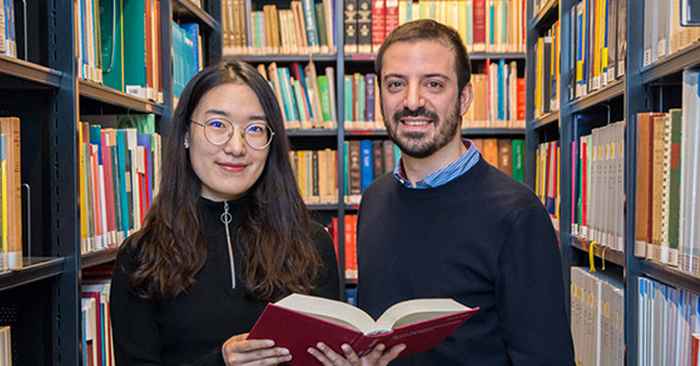‘I wanted to deepen my knowledge of international tax law’

Lucy: ‘I originally come from China and graduated from the Central University of Finance and Economics where I studied taxation. After my graduation, my university professors and senior university researchers suggested that I should apply for the programme and explore more in the field of international tax law.’
Gaetano: ‘I studied law at the Università Cattolica del Sacro Cuore and pursued postgraduate studies in Italian tax law. Subsequently, I started working at a law firm in Milan and I have several years of work experience. Once dealing with international tax issues became part of my daily work, I decided I wanted to improve my skills and deepen my knowledge of international tax law.’
Why the International Tax Law programme?
Lucy: ‘My university professors worked together with several Dutch universities, including the UvA. As a result, they suggested that I should apply for the programme since they know about the high academic standards at the UvA. The Master’s that I am currently pursuing is one of the top five LLMs in the world and I feel that it is a great opportunity for me to learn. The classes are small so I feel more comfortable asking questions during lessons.’
Gaetano: ‘The programme is an advanced LLM and, in my view, the best LLM programme in Europe. Colleagues of mine had already followed this LLM and they recommended it to me without hesitation.’
Experiences so far
Gaetano: ‘I was very satisfied with the programme. Although the workload was sometimes very intense, I feel that I have learned a lot. I also had the chance to meet people from different countries and to exchange different points of view during classes. The professors are very knowledgeable, experienced and always willing to assist us. Finally, the programme provided us with not only theoretical skills but also practical skills. We had at least 5 lectures per week and we discussed case studies in small study groups after classes.’
Lucy: ‘The workload and reading materials could sometimes be challenging. However, the professors and teachers were very helpful. I consider EU tax law a highlight of the programme; the history of the EU and the way EU tax law has evolved over the years was really interesting.’
Trends
Gaetano: ‘International tax law is constantly changing. Digital economy and EU State aid law are two major trends in my field of study. The same goes for tax treaty interpretation.’
Lucy: ‘The Danish Beneficial Ownership cases of the European Court of Justice, the interpretation of the term “beneficial ownership” and the relationship between EU tax law and the OECD Model are very interesting topics.’
Application procedure
Lucy: ‘The application procedure was not particularly complicated. The admission office helped me a lot and they were very responsive. I would advise the prospective students to manage to request assistance in finding accommodation as early as possible. The same goes for possible visa arrangements.’
Gaetano: ‘I would advise prospective students to apply for the early-bird admission. I did so last year, and I managed to arrange my accommodation in Amsterdam as well as other practical issues easily. Luckily as an EU national, I did not have to apply for a visa.’
Tips for students
Gaetano: ‘My advice for prospective students would be to attend the classes and to keep up with the daily study. The first three months can be quite demanding but, at the same time, they are very important. However, if you do your work properly and you understand the basic concepts of taxation during these months, the rest of the year becomes more manageable. In this way, you may have more time to enjoy Amsterdam and other Dutch cities’
Lucy: ‘Studying the reading material before classes is necessary so you can follow the discussions during the classes. But by planning wisely, you will be able to cope with the heavy study-load and generally have more time to enjoy Amsterdam and the Netherlands. Amsterdam is very central, only 2 hours by train to Brussels and 2 hours by plane to Barcelona.’